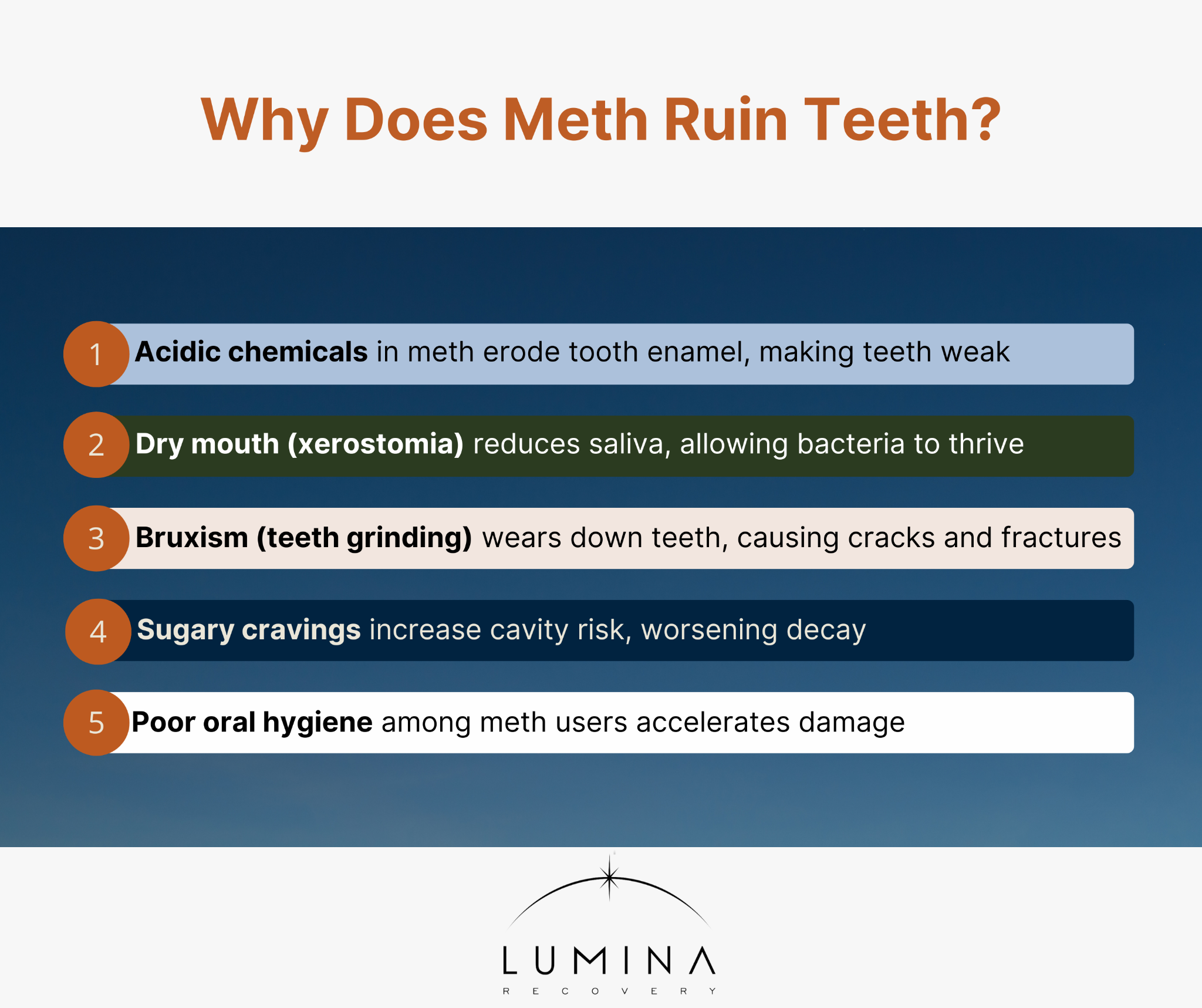Meth ruins teeth primarily due to its highly acidic composition, which erodes tooth enamel, and its ability to cause dry mouth, reducing saliva production that normally protects the teeth. Methamphetamine users often experience cravings for sugary foods and sugary drinks, leading to further tooth decay and gum disease.
The stimulant effects of meth also contribute to teeth grinding, which weakens teeth over time. Combined with periods of poor oral hygiene and prolonged drug use, these factors result in severe dental deterioration, commonly referred to as “meth mouth.”
Understanding the connection between meth addiction and oral health is crucial for individuals struggling with addiction and their loved ones.
What Is Methamphetamine?
Methamphetamine is a synthetic drug composed of toxic chemicals such as lithium, anhydrous ammonia, red phosphorus, and hydrochloric acid. It is commonly used in various forms, including:
- Smoking: The most common method, leading to direct exposure of the teeth to harmful chemicals.
- Snorting: Can cause nasal and sinus damage that impacts oral health.
- Injecting: May lead to long-term systemic effects that weaken the body’s ability to repair damaged tissues.
- Oral Ingestion: Exposes the teeth to corrosive substances for prolonged periods.
Beyond oral health, meth affects the entire body, causing cardiovascular issues, neurological impairment, and extreme weight loss. Meth addiction also contributes to periods of poor oral hygiene, further accelerating dental damage.
The Connection Between Methamphetamine and Oral Health
“Meth mouth” is a severe dental condition caused by the long-term use of crystal meth. Its symptoms include:
- Extensive tooth decay and gum disease
- Blackened, rotting teeth
- Bad breath and dry mouth
- Inflamed and receding gums
Studies reveal the extent of meth addiction’s impact on dental health:¹
- 96% of meth users experience cavities
- 58% have untreated tooth decay
- 23% have all their natural teeth
5 Factors Contributing to Dental Decay in Meth Users
Several factors contribute to the rapid progression of tooth decay among methamphetamine users:
1. Xerostomia
Meth reduces saliva production, leading to dry mouth (xerostomia). Saliva is essential for balancing acids in the mouth and clearing away food debris. Without it, bacteria thrive, accelerating tooth decay and gum disease.
2. Bruxism
The effects of meth as a stimulant cause meth users to grind and clench their teeth, leading to tooth enamel wear, fractures, and increased sensitivity.
3. Poor Oral Hygiene
Periods of poor oral hygiene are common among methamphetamine users. Long binges often result in neglecting personal hygiene, including brushing and flossing. This allows bacteria to accumulate, causing infections and accelerating tooth decay.
4. Dietary Habits
Meth users frequently experience cravings for sugary foods and sugary drinks due to meth addiction’s effects on appetite. These foods and beverages contribute to the rapid breakdown of tooth enamel and increase cavity risk.
5. Chemical Composition of Methamphetamine
Meth contains highly acidic ingredients that directly erode tooth enamel, making teeth weak and prone to tooth decay and gum disease.
Progression of “Meth Mouth”
The severity of meth mouth increases over time:
Early Stages
- Increased tooth decay
- Gum inflammation
- Persistent bad breath
Advanced Stages
- Tooth loss due to extreme decay
- Blackened, brittle, and crumbling teeth
- Severe gum disease leading to infections
- Teeth decayed down to the gum line
Health Implications Beyond Oral Health
Poor oral health extends beyond tooth loss and decay. It can lead to health problems including:
- Infections: Bacteria from decayed teeth can spread to the bloodstream, increasing the risk of heart infections and sepsis.
- Nutritional Deficiencies: Severe tooth loss makes it difficult to eat a balanced diet.
- Mental Health Issues: The social stigma and self-consciousness associated with meth mouth can lead to anxiety and depression.
- Systemic Diseases: Research by the American Dental Association links tooth decay and gum disease to heart disease, diabetes, and respiratory infections.²
Treatment and Rehabilitation
Recovering from meth addiction involves both dental and medical intervention, as the effects of meth on oral health are severe and require comprehensive treatment. Addressing both the physical and psychological damage caused by meth use is essential for long-term recovery and improved quality of life.
Dental Interventions
- Fillings, crowns, and root canals for salvageable teeth
- Extractions and dentures for severe cases
- Dental implants for long-term restoration
Medical and Psychological Support
- Detox programs help individuals safely withdraw from crystal meth
- Therapy like dialectical behavior therapy (DBT) and cognitive behavioral therapy (CBT) treat the psychological aspects of meth addiction
- Medication-assisted treatment (MAT) helps reduce cravings and relapse risk
Preventive Measures
- Educating individuals at risk about the importance of oral health
- Encouraging regular dental check-ups
- Raising awareness of the dangers of methamphetamine use
FAQs
Why does meth cause teeth to rot?
Meth’s chemical composition is highly acidic, and combined with dry mouth (xerostomia) and periods of poor oral hygiene, it accelerates tooth decay and gum disease.
Can meth teeth be fixed?
Yes, but treatment depends on the extent of the damage. Options range from fillings and crowns to dentures and implants.
How do you prevent tooth decay from meth?
Drinking plenty of water, maintaining good oral health practices, avoiding sugary foods and sugary drinks, and seeking professional dental care can help minimize damage.
What does meth mouth look like?
Meth mouth is characterized by severe tooth decay, blackened, broken, and crumbling teeth, and tooth loss due to gum disease.
Is meth mouth reversible?
Some damage can be treated, but in advanced cases, full-mouth reconstruction with dentures or implants may be necessary. Stopping meth use can improve oral health and overall well-being.
Get Support for Meth Addiction With Lumina Recovery
Meth addiction has devastating effects on oral health and overall well-being. From tooth decay and gum disease to severe infections and tooth loss, the impact of methamphetamine use is profound. Recovery is possible with the right support and treatment.
At Lumina Recovery, we offer comprehensive meth addiction treatment, including detox and dual diagnosis care, to support lasting recovery. Our specialized programs also emphasize overall well-being, helping individuals regain both their health and confidence.
If you or a loved one needs help, contact us today to begin the path to healing.
Sources:
- UCLA Newsroom. UCLA study clarifies the oral consequences of methamphetamine abuse.
- ADA. Oral-Systemic Health.




